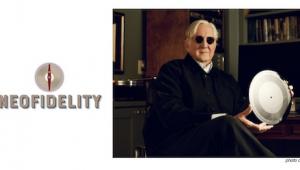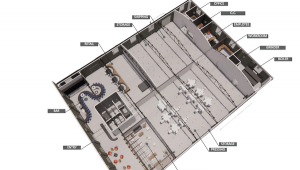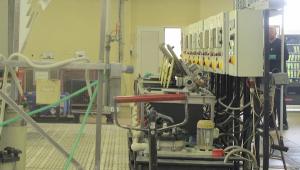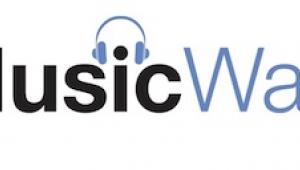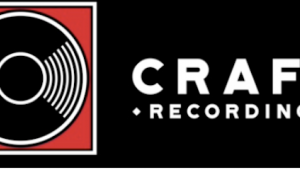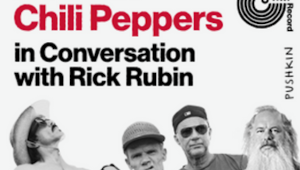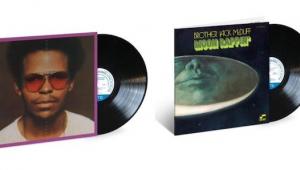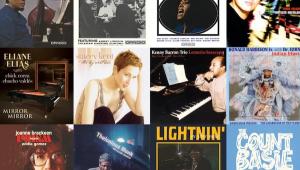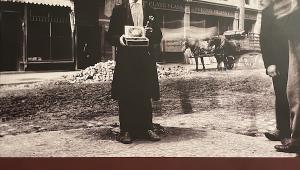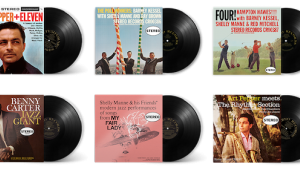Hooray! Can't wait to hear it!
Mark Knopler Cuts a New Song to Analog Tape

- Log in or register to post comments


Nice. This reminds me of a youtube video I watched recently where the director Paul Thomas Anderson was complimented by a member of the press (who was in the audience at a Q&A), for making his latest film "Inherent Vice" in 35mm, as opposed to digital. PTA's response was, essentially, that there's a place for both, and it should never have to come down to the finality of one medium getting to survive while the other doesn't.
The engineer (and producer?) here seems like he views sound recording in a similar way, when he says they're trying to take the best of the old and the best of the new and work with both, to get the best out of both. I like that!
I suppose all of us fans of great sound wish that everything could be recorded in analog, but unfortunately the cost factors-in to be too much for that to occur with many projects these days - which is where we have to hope that when digital is the chosen recording method, the time, care and attention to do it properly, is taken by those involved.

Nothing sounds like natural analog tape compression...Nothing.

Yes, still after all the years I have been involved in audio, nothing beats the sound of an open reel at high speed and preferably a 1/4 inch width minimum for each track. I've been lucky enough to record in a studio in the late 1970s in Australia (Australian Broadcasting Corporation) when you could argue that analogue technology was as good as it was ever going to get (my very best sounding LPs tend to date from this late analogue era). I still remember going into the control room to hear the playback and watching the large reels spinning at 30 ips and being floored by the sheer sincerity of the sound. And it was not as if we were pushing the tape to saturation - these were vocals from a small choir that were laid down on two tracks of a 2 inch tape - the other tracks would be recorded another day - the meters were not pushing very far at all on playback. You just could not criticise it. There is a certain effortlessness about any natural sound that still escapes all digital and is only the domain of the best analogue. Yes, we still get a lot of it with our LP playback but nothing - just nothing - beats hearing a first generation analogue master tape recorded by a top notch engineer. Mind you, some of these vinyl labels like Fone are doing a brilliant job. Contemporary recordings made on vintage equipment that at the same time sound completely fresh but with the signature of those golden age recordings.

If this new LP is going to be in the similar style to Rag Picker's Dream or Shangrala this thing is going to rock! I wish he had done the previously mentioned on analog.

1. Damn he looks old...really old...which means I'm old...damn.
2. Yeah, tape is great, yada, yada, yada...just give me that Alfa Romeo roadster. Holy shnikey, I just went from 6 to midnight.


Isn't this using a system called clasp. Digital to tape to digital. Nothing special here.


The reason he started recording digitally was he was tired of the sound changing day to day. Neil Dorfsman (producer and engineer on many Dire Straits records) told me while recording the song Private Investigations, Mark was really angry that the piano sound changed day to day when doing overdubs and he wanted a more stable way to lock sounds in. So they started recording to digitally swearing he'd never go back to analog. Guess enough time has passed that he's forgotten his frustration with analog tape.

But, he always got it anyway, and I hope others share in this joy and buy this album.

I've been producing music for years. I started on 2 inch tapes, went the protools way, came back, etc...
Sorry to break the news a bit violently, but nowadays one can record without going through a board, straight to the computer, and make it sound just like analog with a couple of add ins that dont cost a fortune.
Mixing is the same. No need for magnetic tapes.
The key is proper miking, the rest is BS.
One thing that's important is the talent of the mixing engineer, and another is the quality of the mastering, and to master in 16bit is anathema. 24bit is better. And killing the top frequencies as if you were mastering for vinyl is a nice little trick too. Pressing vinyl: use Optimal in Germany or RTI in the US. No need for 180g, 140g is just fine. 33RPM is good, 45RPM is better.
Etc...

Hi Michael
A lot of things are happening between the voicing/playing of a song and it being listened to by people like you and us all.
Disclaimer = my experience is mostly Jamaican music, but also hip hop, rap, and some rock. I can't say anything about classical, and other genres.
I've seen stuff go haywire at all stages:
1. the singing / playing: since nowadays virtually anyone can record themselves, a lot of crappy singing is allowed to exist. Back in the good old days, you had real A&R and more importantly, artists had to perform for a very long time before going in the studio, be it in church or onstage. And if they weren't passing that crucial stage, they were NEVER going to be allowed near a studio!
2. the miking (have noticed that many engineers don't mike properly, because they feel they can correct the shitty stuff with their stupid protools tools which make them feel like God)
3. the recording: the amount of processing that is taking place nowadays is just crazy. Some engineers seem to think that if they dont use 10 zillion plug ins they are not giving their customers their moneys worth. So much cut and pasting is going on, so much sequencing, melodyne on vocals, instruments, autotune by default, etc....
4. the mixing. Why do engineers feel like they have to be in the red just to be in the red???
5. the stupid compression. Compression is good if used sparingly and with a purpose. Nowadays, you compress the shit out of the sound. You dont know why but you do. Maaaadness!!!!
6. mastering: I often hear kids say silly things like "why should I master anyway? Costs a lot and my sound is booming as it is.... I just normalize..." yeah, right, and your stoooopid bass is too boomy, your highs are shrill, and your mids are vulgar. and the whole thing sounds like a chainsaw on granite...
7. vinyl can be pressed like crap too.
As far as pressing plants go, you're absolutely right. I still dont rate MPO like Optimal, and GZ is far from Optimal. I've used both and I like GZ, but I freaking LOVE Optimal.

I can't agree with everything you say but I certainly agree that the greatest opportunities to damage the music occur before it ever hits the mixing desk and then the subsequent skills (or more precisely the lack thereof) of the mastering engineer. In my experimentation with digital over the last 7 years, the potential to completely ruin something is extreme and great care needs to be taken in the digital domain just as much - often even more so - than in the analogue domain. I can actually comeup with a zillion more ways to stuff up a perfectly good digital session recording on it's way to the consumer than I can an analogue one. I think the extremely high and extremely critical listening skills required by those who work with digital is a good reason why it mostly sounds so bad these days to my ears. The technology itself is fine because I use it myself and the issues are largely insignificant. But finding good digital drivers of those remastering suites is a completely different story. It's not just the plug-in brigade either. There's a video on YouTube of an EMI engineer completely ruining an original late 1950s classical music recording because he felt he wanted to push the direct digital copy back into the analogue domain to put it through an analogue EQ and then back into the digital domain. Instant fail. The result was that all the original pace, timing and subtle inflections were lost, all in the pursuit of a dubious EQ to make it sound more "pleasing" to contemporary ears. Most hardcore audiophiles will understand that the less done to these older recordings, the better off we are.

When you say "Record Technology in The Netherlands" do you mean Record Industry (the former CBS plant in Haarlem, The Netherlands), best known for pressing Music on Vinyl's titles? If so, you're right, they do possibly the most perfect pressings around these days.

I've got 8 or 9 of their releases and they are all stellar. I just wish they would focus a little less on soundtracks and more on the many early 90's (the CD craze ablaze) titles that either never came out on vinyl or have long been out of print, i.e. Wildflowers - Tom Petty / Nick of Time - Bonnie Raitt / Flying Cowboys - Rickie Lee Jones / Joshua Judges Ruth - Lyle Lovett / Barefoot Soul - Sonia Dada, etc. I send them Title Requests once a week.

Using tape, or sometimes just the deck's electronics, as a "flavored passthrough" (for lack of a better description) is a technique sometimes used to help get a particular sound within the financial and expertise limitations of modern recording (the digital studio, which won't or can't employ an all-analog chain). By the way ... is the music any good? << first question
Hey, has anyone read the old JGH interview with Keith Johnson? Fascinating early-'80s discussion of analog tape's challenges and potential advantages (and digital's!) in the context of not only the music but of recording technique as well.
http://www.stereophile.com/content/keith-o-johnson-reference-recordings
One takeaway from it for me was that the U.S. might-could have been on the cusp of switching to some new European bias formulations that addressed historical issues of noise and capacity but did not, as the CD was dawning. Just another nugget of insight (hindsight?) as to how/why record labels actively worked to rid us of tape and LPs ... to THEIR detriment, we can argue.

that some artists never record analog. For instance - one of the greatest voices of the zero years, Anna Netrebko - her voice was in its prime between 2002 and 2012 and I listened to her many times at the Viennese Opera live. It is a shame that her voice was only recorded digitally, as far as I know. And it does definitely not work. There is a loss in warmth compared to live. So next generations will never know how wonderful this voice was. And so Callas will remain the better voice for years to come - as long you get an old mint Columbia mono vinyl ot reel-to-reel of Callas (forget the remastered actual CD). Wonder, why Netrebko herself is not interested in recording her voice once for eternity. Somehow crazy.

Perhaps it was a rhetorical question but it's not the artist's responsibility to also be producers and archivists. The ones that take an interest in that likely do so tangentially or maybe as a hobby but it (sound quality) would be a coincidence. The other thing is, you can't always know when you're in "the peak moment" that you could or should maybe put on another hat and perform another duty.

@Utter BS,
You are completely wrong to think that there is any plugin that emulates "analog". The only thing those dumb plugs emulate is a poorly maintained deck. What makes me laugh when musicians hear a playback off tape is how shocked they are at the fidelity of the medium. So much more like "being there" than any digital system - and I've used them all from RADAR Nyquist series to Apogee Symphonys and PT HD. My guess is you haven't used top caliber analog systems or you would have never made that statement.
Anyhow, it looks like the recordings must have been done on a CLASP system. The fact that he's recording on an ATR 102 and that it sounds like more than a two track recording is telling :). Also I noticed three different consoles - an API, an EMI TG series (with the Payton faders) and a third where the faders looked like something off a newish Neve (maybe a VR) so this recording looks like is was done in a few different studios - I doubt they were dragging their tapes around.
No idea why they would "CLASP " to a 102 though - those things are so transparent (though the high headroom when tracking "through tape" to digital usually makes for a better sounding record than tracking straight to digital... Maybe it was just a cut shot for the mix down? That's where ATRs are normally used. I've done many records through CLASP and mixed the digital files to an ATR102 which was used for the masters - now that's a sound hard to beat!
Anyhow regarding the "New Euro bias formulations" - they must be talking about alignment references. In Europe it was mostly CCIR where in the States it was NAB. CCIR wasn 't that new, it's just that NAB was REALLY old. The basic difference is that CCIR had an approximent 2.5dB higher pre emphasis at 10k making tape hiss much less noticable - and when recording to 2 inch 16 track or 1" 8 track the noise floor would be lower than any playback system. That's why some old EMI 1/2" 4 track recordings will sound better than some newer 24 track NAB stuff. The problem was that many US studios in the US did not have CCIR capabilty on their machines so they stuck with NAB. Even guys with Studers or Otaris which could do both stuck with NAB to make sure they were compatable with other US studios. Thing is though, NAB had a sound - thicker bottom etc. that many simply preferred.
Anyhow, if you want to get anything out of my post, note that most engineers during the analog days were going for fidelity all the way. All this talk about the sound of tape, tape compression etc was something we avoided 99% of the time unless going for a specific effect. To this day, the closest you'll ever hear from a fidelty point of view to a perfectly aligned ATR 102 is perhaps mixed down to DSD. I wouldn't fuss to much about the tracking stage (CLASP or not) because the mix is the sonic intention of the artist and the trackng stage has been sonically accounted for in the mix. Ideally what you want is the highest fidelity master possible. That isn't to say tracking to tape wouldn't be the ideal - but as a vinyl lover it should't be an issue - you are still listening to non-digitally converted mix/master.

Here you go:
https://www.youtube.com/watch?v=PfA61_noOQQ
The comparison starts at 6' 38" but the whole video is worth watching as it shows what the whole process was. Opinions would vary. I would not object to some incredibly sparse EQ in the analogue domain if this was a remastering of the original tape onto LP (say, for example, HiQ records are doing the EMI catalogue onto LP) but in my view I would have preferred the original material to be untouched. Even on the Youtube video you can hear how the string section has been dulled down and instead of hearing 14 string player's bows each changing direction milliseconds apart and hearing the individual sheen of each separate "E" string, it suffers from the typical problem I always had with CD remastering and EMI remasterings in particular. I call it the clumping effect. You lose half the string section but the volume stays the same. What happens by doing this processing is that we are removing an original hand made glass window pane with it's inherent surface imperfections and replacing it with a perfectly flat modern, tinted alternative. The character and charm are gone and it is no longer as faithful to the original as the flat digital copy. EMI have always been the worst offenders when it comes to classical reissues - they way over process everything. Take any of the recent HiQ vinyl LP reissues and compare them to the CD equivalents and in my opinion it is an example of what not to do when you are remastering in the digital domain. An even more stark example is Columbia EMI SAX 2253 (Oistrakh violin recital) recently reissued onto vinyl with the CD reissues from the EMI catalogue. The differences are extremely significant and obviously to my ears the LP reissue is far more pallatable and - as an ex-violinist myself very used to hearing other violinists playing 3 feet away from me - much more realistic.


Watching the Abbey Road video, I'm struck by the fixation of the mastering engineer to the computer monitor and the way the visual tools become the center of his experience as an engineer. Music is decimated into separate events and treated like still photographic representations in Photoshop, where some high frequency unpleasantness is pasted over by using the adjacent information that looks similar but is now completely out of time synch with the lower frequency events. Any of the subtle supporting relationships between the low and high end has been algorithmically smeared as in flattened and disconnected. If we're looking for reasons why analog sounds better, that seems like an obvious one.
These well meaning people must train themselves not to hear what is lost in the process.

That fact that there are redbook recordings that sound good on vinyl but awful on CD suggests that it's not the digital recording process that's at fault.

I'm no recording expert, but I know when my band recorded using pro tools it was trash, terrible! We ended up going back to using an old 4 track and it sounded great.
I think more bands are starting to do this, "White Fence", "Ty Segall", "The Growlers" just to name a few. I hope it continues.
BTW Michael, your 1990 MTV screen test was great, you were about 25yrs ahead of your time.

I shouldn't have used the word 'good' what I meant to say was digital recordings can sound like the original performance. There is far too much subjectivity in the audiophile world, either a recording sounds like the original or it doesn't.

Nothing was cut to tape. Not that I really care, but a tape machine was used as a 'pass-through', the signal then going to digital... That's the CLASP system. If you dig deeper into interviews and videos about the recording of this record, they make it clear, although cursory looks at their recording notes, give the impression that everything was 'cut to tape'. I always find it interesting how some artists/engineers wax on about the wonders of analog tape, while they record or mix or master to digital.

It seems ironic at first that folks are excited about this "analog" recording because of transparency reasons because if in fact the CLASP system is being used then it's only purpose is to capture the colorations added by tape such as the tape compression and / or EQ shifts (warmth) as a pass through to the digital recorder.
But the real irony perhaps is that this may in fact enhance transparency IF the result of CLASP usage is that poorly understood digital plugins such as the evil "multi band compression" plugin are not used since compression is handled by the old school "simpler" devices that did it so well.
I do agree that pre digital analog is the best sound I've yet to hear but I also believe that the gap between digital era recordings and analog era is dramatically widened by the misuse and overuse of the plugins / processors.
Try this, download Garage Band and load up a couple songs that it comes with -- I did this with Logic and the song was a tune by The Killers -- take a look at how many plugins are being used! The amount of digital processing is mind numbing -- the original sounds were quite full and nice and dynamic.
My point is that it's not so much an analog or digital thing it's really about the processing and what has been in vogue for popular music in the last decade.
Brian Eno recently talked about this, how analog engineers only had a few tools but knew how to use them well whereas today's digital engineers have an overwhelming amount of sonic manipulation tools and use them very very poorly.
I'm not sure how much is stylistic -- that is , are we in an era of unnatural over compression and over reverberation by mistake or by design -- either way my ears dislike it quite a bit.
But perhaps in this way these Knopfler guys are on to a best of both worlds -- that is, using digital for what it's best at and perhaps avoiding the pitfalls of "digital processing" by using analog tape and tube compressors (Fairchild tube compressor and Pultec tube EQ I think I trainspotted in the video).
My guess is that this record is going to sound fantastic -- ironically it may be destined to be one the best "digital" recordings of recent years.
JBo
True Vinyl Radio

(the fact I received a email that MK was releasing a new lp)!
Really, that's all it took!
I'm beyond happy that you say it is recorded "all analog".
I had pre-ordered it a couple of weeks ago.

I wish I knew why no one's yet reissued the soundtrack to "Local Hero."
Amazing Knopfler recording that sold well, yet aside from a Japanese remaster on CD it's never been reissued, especially not on vinyl.
Meanwhile we often get another new release of some other random album already released in six other audiophile editions over the past ten years. :(

More about topic...
http://www.guyfletcher.co.uk/index.php/2014mkrecording/2014StudioDiary3





